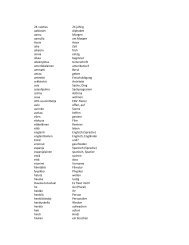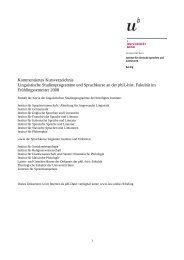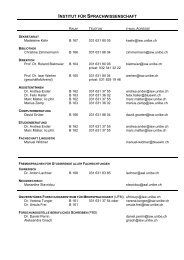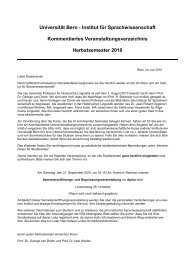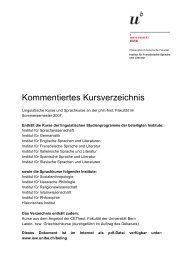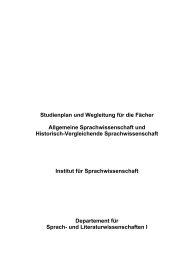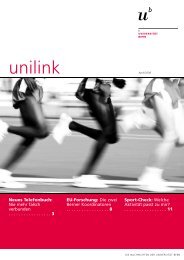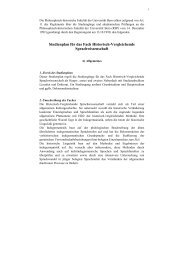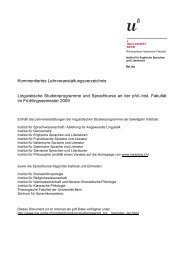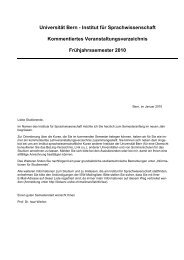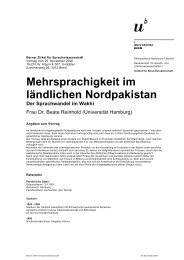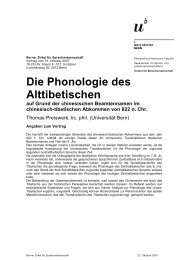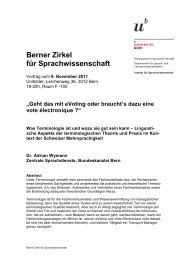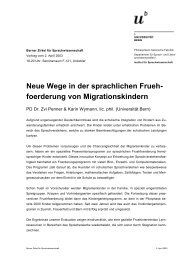The expression of modality in Korean - Institut für ...
The expression of modality in Korean - Institut für ...
The expression of modality in Korean - Institut für ...
Create successful ePaper yourself
Turn your PDF publications into a flip-book with our unique Google optimized e-Paper software.
20<br />
(b)<br />
(c)<br />
(d)<br />
(e)<br />
diiga apé-ti<br />
(I heard the game and him, but didn’t see it or him)<br />
diiga apé-yi<br />
(I have seen evidence that he played: his dist<strong>in</strong>ctive shoe pr<strong>in</strong>t on the<br />
play<strong>in</strong>g field. But I did not see him play)<br />
diiga apé-yig<br />
(I obta<strong>in</strong>ed <strong>in</strong>formation from someone else)<br />
diiga apé-hiyi<br />
(It is reasonable to assume that he did)<br />
Evidential systems may differ enormously from language to language. I will, therefore<br />
content myself for the moment with these pr<strong>in</strong>cipal remarks on evidentials.<br />
1.1.3.5. Dynamic <strong>modality</strong><br />
<strong>The</strong> term dynamic <strong>modality</strong> was first co<strong>in</strong>ed by von Wright (1951, 28), albeit only <strong>in</strong> a<br />
footnote, and l<strong>in</strong>ked with the concept <strong>of</strong> ability and disposition. It is one <strong>of</strong> the three<br />
categories on which Palmer (1986) concentrates his analysis, the others be<strong>in</strong>g epistemic and<br />
deontic <strong>modality</strong>. It is, however, not always clear what dynamic <strong>modality</strong> is precisely<br />
understood to be. Palmer (1986, 103) <strong>in</strong>cludes non-epistemic possibility and necessity and<br />
also uses the label „subject-oriented“ <strong>modality</strong>, and concludes that „if any k<strong>in</strong>d <strong>of</strong> <strong>modality</strong> is<br />
basic it is, surely, dynamic <strong>modality</strong> with its notions <strong>of</strong> will<strong>in</strong>gness and ability“. Other<br />
variations exist, such as Perk<strong>in</strong>s’ (1983, 11) use <strong>of</strong> dynamic <strong>modality</strong> to refer to „the<br />
relationship which exists betwen circumstances and unactualized events <strong>in</strong> accordance with<br />
natural laws - e.g. those <strong>of</strong> physics“, but to also <strong>in</strong>clude Rescher’s boulomaic <strong>modality</strong><br />
(denot<strong>in</strong>g, <strong>in</strong> essence, volition).<br />
In this study, I will refer to dynamic ability as express<strong>in</strong>g solely the notion <strong>of</strong> ability<br />
and disposition. With<strong>in</strong> this category <strong>of</strong> <strong>modality</strong>, I will further dist<strong>in</strong>guish between two subtypes<br />
<strong>of</strong> dynamic possibility, namely a) possible <strong>in</strong>ternal capability which implies an<br />
environmental or contextual constra<strong>in</strong>t, and b) possible <strong>in</strong>ternal knowledge or acquired<br />
capability <strong>The</strong> first notion <strong>of</strong> dynamic <strong>modality</strong> may be illustrated by the follow<strong>in</strong>g example<br />
from Ch<strong>in</strong>ese (taken from Norman (1988, 166)):



